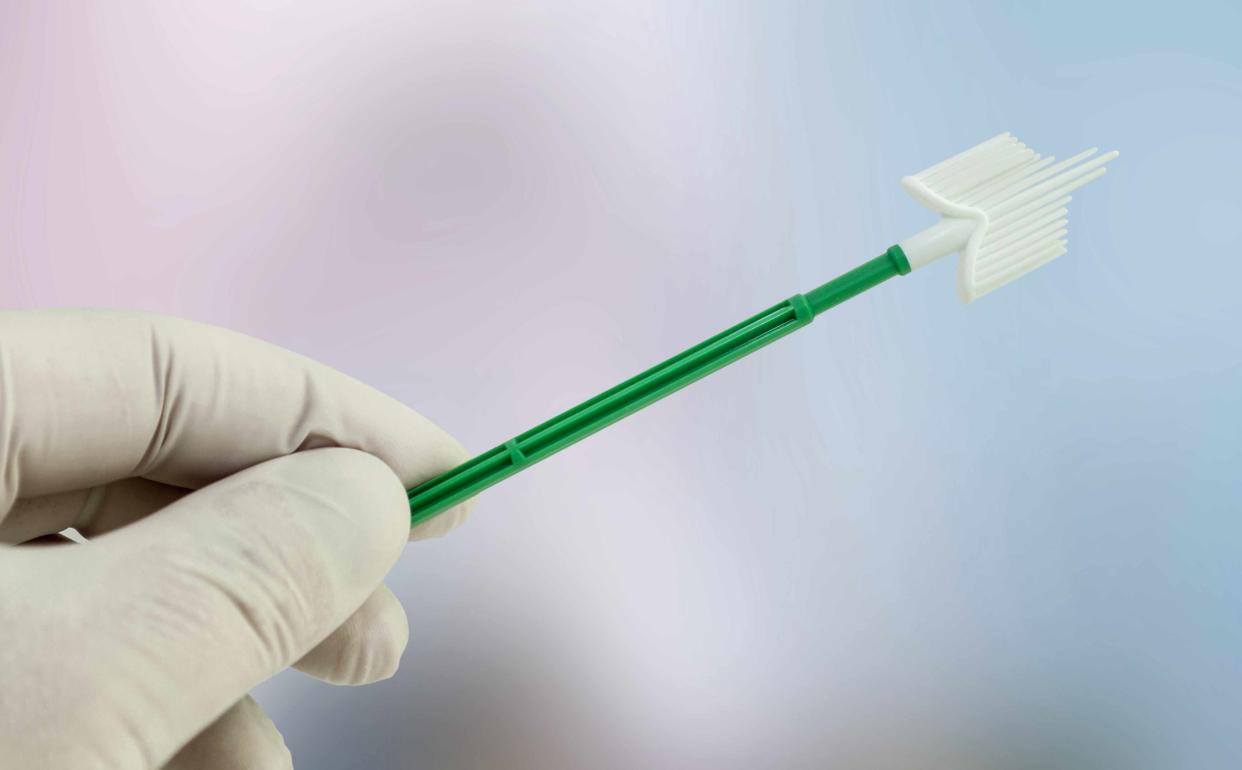FDA-Approved HPV Self-Screening Tests Aim to Improve Cervical Cancer Prevention

Lalocracio / Getty Images
Fact checked by Nick Blackmer
Key Takeaways
The FDA has approved a new method of self-screening for HPV, increasing accessibility to cervical cancer screenings.
Self-screening tests allow individuals to collect their own samples at a clinic, but manufacturers may consider offering at-home tests.
If a self-screening test comes back with positive results for HPV, follow-up exams with healthcare providers are still crucial.
The Food and Drug Administration (FDA) has approved self-testing options for the human papillomavirus (HPV) virus, making cervical cancer screenings more accessible.
HPV is the main cause of cervical cancer, which affects about 12,000 women in the United States each year.
Healthcare providers typically conduct HPV tests with a pelvic exam. A medical tool called a speculum is used to widen the vagina so the healthcare provider can collect cells from the cervix for testing.
With the expanded approval, someone “can go into a clinic or potentially even a retail pharmacy, take the swab, place it in their own vagina, and then that swab can be sent to test for the high-risk HPV strains,” said Anne-Marie Amies Oelschlager, MD, a professor of obstetrics and gynecology at the University of Washington.
The approval for self-screening is reserved for the doctor's office currently, but at-home tests may be available in the future. Oelschlager said many people don’t get screened for cervical cancer because they live in reproductive healthcare deserts or avoid pelvic exams due to painful or traumatic experiences in the past. People in the LGBTQ+ community sometimes avoid screenings out of fear of discrimination.
“Our hope is that expanding opportunities and options will allow more people to be able to access the screening that is recommended,” Oelschlager said.
Related: Add These Preventive Cancer Screenings to Your Calendar
How Often Should You Screen for Cervical Cancer?
The American Cancer Society recommends cervical cancer screenings starting at age 25. Women ages 25 to 65 have the option to get the HPV test or a combined HPV and Pap smear test every five years or a Pap smear alone every three years.
Unlike HPV tests that look for infections with high-risk HPVs, Pap smears detect abnormal changes in cervical cells. Healthcare providers have traditionally used speculum exams to perform both tests.
“These approvals for self-collected vaginal specimens are the latest example of the FDA’s continued commitment to expanding cervical cancer screening options for patients, particularly for individuals currently not participating or engaging in routine screening,” an FDA spokesperson told Verywell.
The new self-screening option helps make HPV testing more accessible, but it does not replace regular physical exams, including Pap smears, according to Joshua G. Cohen, MD, FACOG, FACS, the medical director of the gynecologic cancer program and a board-certified gynecologic oncologist at City of Hope Orange County in Irvine, California.
“The HPV test is a first step in the assessment for precancer or cervical cancer. If someone tests positive for HPV on a self-screening test, it will be important for the patient to follow up with a medical provider for an in-office exam and evaluation,” Cohen told Verywell in an email.
Related: Abnormal Pap Smear Results: What Do They Mean?
HPV Vaccines Can Also Reduce Cervical Cancer Risk
Screening is important for early detection, but the HPV vaccine is also key for preventing cervical cancer.
“The best way to stop cancer is to prevent it in the first place, which is why HPV vaccination is just as important as screening,” Cohen said.
The Centers for Disease Control and Prevention (CDC) recommends HPV vaccination for people ages 11 and 12, but vaccination can start as early as age 9. Anyone who didn’t get the vaccine as a preteen is recommended to get it through age 26. Some people ages 27–45 can get the HPV vaccination after talking to a healthcare provider about their risks.
“We know that cervical cancer is preventable through vaccination against HPV, screening, and clinical management of abnormal results,” Cohen said. “The new self-screening HPV test could help reduce barriers to care and could be seen as a less invasive option for women. The goal is for as many women as possible to get screened.”
Read Next: What the HPV Vaccine Does If You’re Already Infected
What This Means For You
The FDA's approval of self-testing options for HPV means that cervical cancer screenings are now more accessible, especially for those who may avoid traditional exams due to discomfort, past trauma, or lack of access to healthcare facilities.
Read the original article on Verywell Health.

